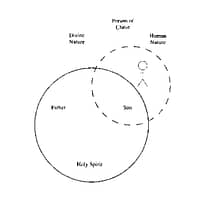
The Person of Christ
- Jesus Christ was fully God and fully man in one person and will be so forever.
- Christ’s virgin birth shows salvation comes from the Lord, made possible the uniting of full deity and humanity in one person, and enables Christ’s humanity to be without inherited sin (Galatians 4:4-5).
- The full humanity of Christ is seen in that he experienced all human weaknesses and limitations of having a human body, mind, soul, and emotions; yet he was without sin (Hebrews 4:15-16).
- Jesus’ full humanity enables him to accomplish our representative obedience (Romans 5:18-19) and be a substitute sacrifice for us (1 Timothy 2:5).
- The incarnation was the act of God the Son whereby he took to himself a human nature (John 1:14).
The Deity Of Christ
- Jesus is called God (John 1:1, John 20:28), “Lord” in ways that indicate his divine nature (Luke 2:11). Christ also referred to himself with divine names such as “I Am” (John 8:57).
- Jesus possessed attributes of deity such as omnipotence, eternity, omniscience, omnipresence, sovereignty, and being worthy of worship (Revelation 22:13).
- Jesus’ deity was necessary because (1) only someone who has infinite could bear the full penalty of the sins of believers; (2) salvation is from the Lord; (3) only someone who was truly God could be the mediator between God and man (1 Timothy 2:5) and reveal God to us.
Three Inadequate Views Of The Person Of Christ
- Apollinarianism: Christ had a human body but not a human mind or spirit.
- Nestorianism: There were two separate persons in Christ, divine and human.
- Monophysitism (Eutychianism): Christ had only one nature, which was more than human but less than divine.
 The Chalcedonian definition of the person of Christ (AD 451) refuted these inadequate views and became the standard orthodox statement on the biblical teaching on who Christ is. It affirmed that the eternal Son of God (1) took to himself a truly human nature; (2) his divine and human natures remain distinct and retain their own properties: (3) yet they are eternally and inseparably united together in one person. This definition means that one nature does some things the other nature does not, and anything either nature does, the person of Christ does.
The Chalcedonian definition of the person of Christ (AD 451) refuted these inadequate views and became the standard orthodox statement on the biblical teaching on who Christ is. It affirmed that the eternal Son of God (1) took to himself a truly human nature; (2) his divine and human natures remain distinct and retain their own properties: (3) yet they are eternally and inseparably united together in one person. This definition means that one nature does some things the other nature does not, and anything either nature does, the person of Christ does.
*Resources Added From Wayne Grudem, Systematic Theology
The Doctrines of Christ & the Holy Spirit – Part 1 – Jesus Christ Was Fully God and Fully Man
The Doctrines of Christ & the Holy Spirit – Part 2 – Jesus Christ Paid The Penalty of Sin
The Doctrines of Christ & the Holy Spirit – Part 3 – Jesus Resurrection and Ascension
The Doctrines of Christ & the Holy Spirit – Part 4 – The Work of The Holy Spirit
Mike Mobley
Follower of Christ, Husband to Joelle, Father to Peyton & Matthew, Finance & Operations Pastor at 121 Community Church, SAG-AFTRA Actor, Founder of Before The Cross, Owner of MMWCS, and Podcast Host for the Not Quite There Show.


















